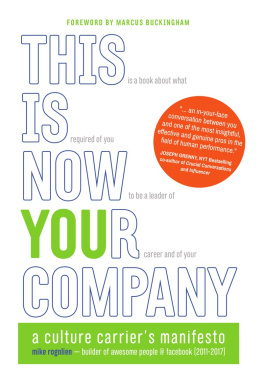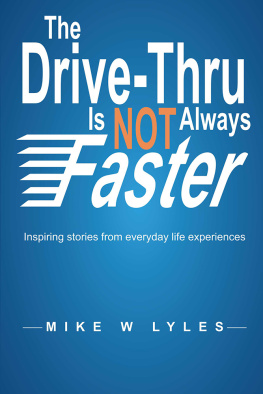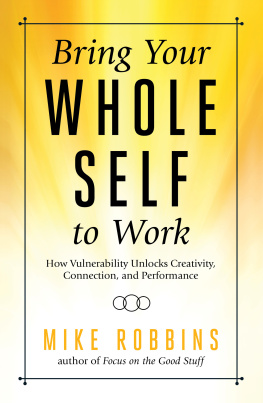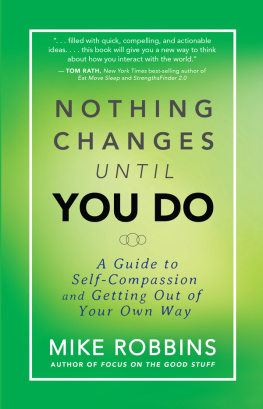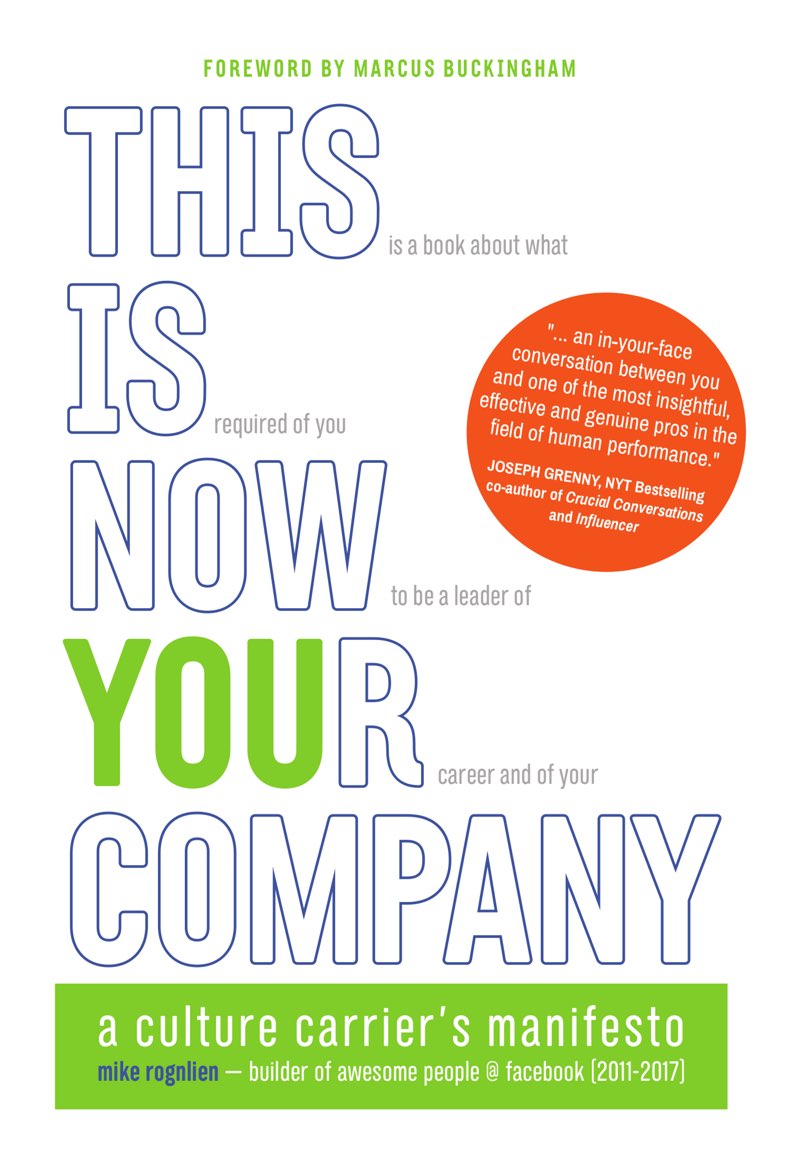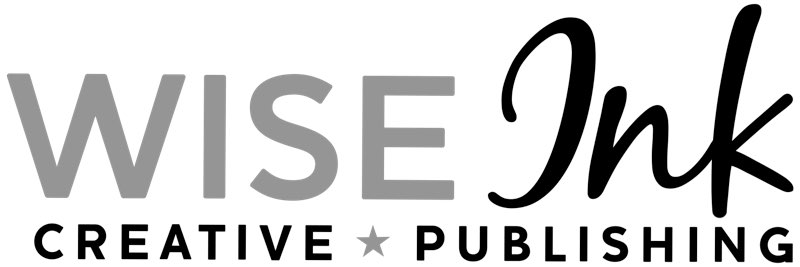This Is Now Your Company
A Culture Carriers Manifesto
Mike Rognlien
Copyright 2018 by Mike Rognlien
All rights reserved .
No part of this book may be reproduced in any form or by any electronic or mechanical means, including information storage and retrieval systems, without written permission from the author, except for the use of brief quotations in a book review .
For my mom and dad, all of my incredible teachers, and all of the people who, like me, march to a slightly different drumbeat .
And, of course, Oprah .
Foreword
Facebook is a radically different place to work. A place that will change the world of work in the same way that Facebook, as a product, has changed all of our worlds. What makes Facebook different is not just the hacker culture, the move-fast-break-things spirit, the high-tech wizardry, or even the leadership prowess of CEO Mark Zuckerberg and COO Sheryl Sandberg. What makes Facebook different is how its cultivated a radical idea: namely, that each human being is unique, and this uniqueness is a feature to be maximized. This is the very building block upon which the entire company is built .
Most companies do not see this uniqueness as a building blockin fact, they see it as a frailty, a bug to be fixed. Certainly not a feature. But Facebooks entire company is built on the single premise that one size fits one. That no two engineers are the same, that each salesperson is motivated by different things, that each designer is idiosyncratic, and that each leader must find his or her own way to individualize .
So while every other company is building standardized competency models for each role, against which every individual in that role will be judged and measured, their gaps identified, their weaknesses fixed, Facebook is doing the opposite. Its helping each person to identify, claim, and contribute their unique strengths to the team. Because it seems to know that in every hallway, every meeting, and every conversation, the ingredients of excellence are as varied as the human race .
Mike not only embodies this sort of intelligent individualization; he also taught it to thousands and thousands of new Facebookers. If you worked at Facebook at any point during his six and a half years at the company, one of the first things you likely did was go through his talk on cultural ownershipThe Call to Actionin n00b orientation. It was in this talk that you learned a bit more about your personal connection to Facebooks mission, maybe some of Mark and Sheryls practices, and a lot about your responsibilities to your colleagues. But also, here is where you learned about Facebooks radical strengths-based philosophy. Here is where you learned to take yourself seriously. Here is where you learned to identify what is unique about you and how to contribute your uniqueness to your team. Here is where you learned that this, at heart, is what Facebook would always ask of you. Mike and his team brought this all to life, for thousands of Facebookers, and showed each one of them how to make their unique dent in the world .
If Facebook has a unique culture, and if Facebook stands as an example of a better way to build a companyand it doesthen Mikes insights, lessons, and passion helped make it so .
So if you want your company or your team to get as much from its people as Facebook doesas much collaboration, creativity, drive, resilience, hackernessthen read this book. Its a tell-all about whats really worth telling about Facebook .
Marcus Buckingham, NYT-bestselling coauthor of First, Break All the Rules and author of Now, Discover Your Strengths
Part I
You and Your Company
1
The Chapter about What Its Really Like to Work at Facebook
www.facebook.com/ careers
2
The Chapter about the Rest of the Chapters
(Sorry if chapter 1 pissed you off, but this isnt going to be that kind of book .)
I first spoke about my work at Facebook at an external conference in late 2011. I had only been at the company for six short months and, I have to say, I was incredibly excited to be a featured speaker at a conference I had enjoyed in the past as an audience member .
For my breakout session about developing people at Facebook, I was assigned one of the myriad midsize breakout rooms. This, despite telling the conference organizers that every time my coworkers spoke externally, the events were standing-room only, even in really large spaces. I explained: Hey, this is not my ego speaking, but I work at one of the most curiosity-inspiring organizations in the world right now. As soon as people see the word Facebook, they will want to attend .
I wasnt wrong; they did show up, and in droves. The room was filled to overflowingso much so that the facilities manager for the hotel came into the room and broke up my session before it even started, asking more than half the people in the room to please go find another talk. (I dont know if the now-commonplace Yaaaaaaasssss! was a thing at that time, but if it was, it was probably at least hovering in my thought bubble .)
I think I did an OK job with that session after the excitement of having my party busted up by the cops (all right, the hotel cops) subsided. While most people listened attentively as I spoke about Facebooks culture and philosophy, I could see that more than a few of them didnt really take me seriously. Im not sure why they were theremaybe they hoped theyd get some free Facebook swag (they didnt) or some gossip on the company or its employees (they certainly didnt). It was clear to me that when I spoke about treating everyone in the company as a leader and expecting them to behave accordingly, it was to many in the audience an amusement at best and a totally idiotic way to completely fuck up a young company at worst. Their folded arms and their Yeah, right! body language spoke volumes .
(Quick side note here: yes, I used the F-word! Because its what I used at the time and is biographically accurate! And yes, I know I used it in a business book. I could have opted to say f*ck instead, sure. And nobody, including you, would have thought that I meant fack or fick or feck or flowers... Im trusting that you are capable of seeing that word and not losing it, and if you hate that word, dont read it out loud. Dont say it yourself. But it is a word people use, its a word I occasionally use, and even if you dont, I hope well still be cool .)
So you just let everyone in the company give the CEO feedback? asked one woman, with thinly veiled snark. She was asking this in reference to my sharing that Mark Zuckerberg, our CEO, did a full-company Q and A every single Friday at four oclock, and anyone on the payroll could ask him a question, share feedback, challenge a decision, etc. And they did. (And noI wont be talking about any of their questions or his answers. Again, not that kind of book .)
In every question from this doubting audience, there seemed to be an underlying disbelief that anything but the oldest of old school organizations would ever survive, let alone succeed. Feedback was always top-down or something you shouted on your way out the door as you lit the bridge between yourself and your former employer on fire. Big, risky ideas were great, but only after they were fully vetted and approved by someone much higher up on the org chart, and they certainly werent something you could just let people take action on without any supervision or guidance or accountability. Authenticitybeing who you really were at work ?

